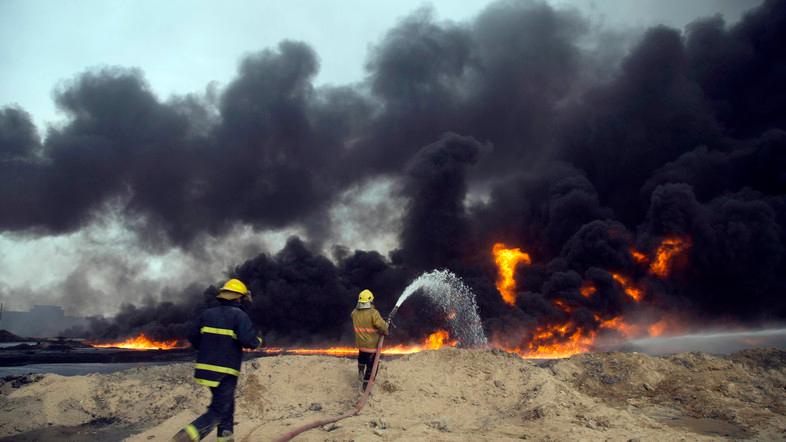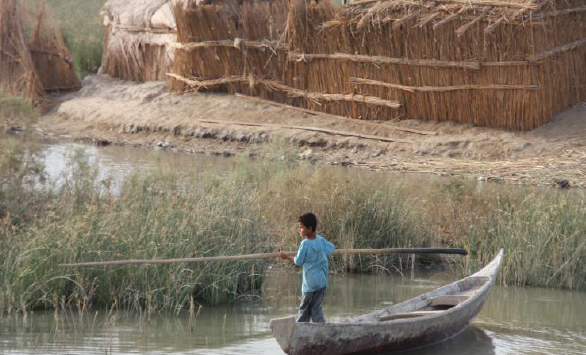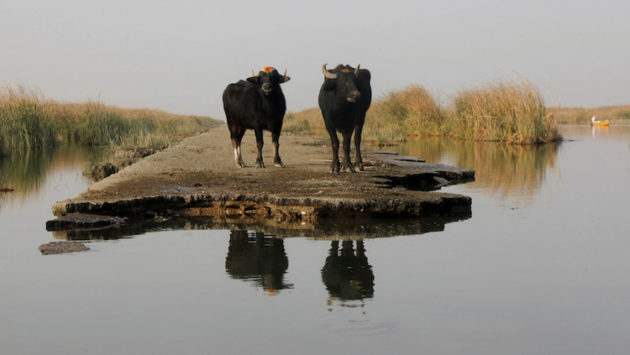Joint statement on the International Day for Preventing the Exploitation of the Environment in War and Armed Conflict
Human security requires environmental security
Joint statement on the International Day for Preventing the Exploitation of the Environment in War and Armed Conflict, November 6 2018
Original statement here
Today, our group of concerned civil society organisations, which includes academics, experts and scientists, are calling for the international community to enhance the protection of people and ecosystems by taking meaningful steps towards addressing the environment throughout the cycle of conflicts.
Environmental issues are increasingly at the forefront of armed conflicts across the world directly affecting the lives of people, disrupting ecosystems, impairing the resilience of communities and impeding post-conflict recovery and peacebuilding. In the conduct of hostilities, breaches of international humanitarian law, international human rights law and international environmental law often threaten the environment and, by extension, human life, health and livelihoods.
Throughout the last year, we have witnessed numerous examples of the means through which environmental degradation and damage can threaten the security of people and states. In Iraq, the legacy of years of conflict, weak governance and climate change has resulted in water pollution that has hospitalised more than 100,000, generating popular protests and a violent response, while wildfires sparked by military activities have destroyed large swathes of forests in Kurdish areas of Iraq, Iran and Turkey. In Somalia, and Africa’s Lake Chad region, environmental degradation and natural resources are fuelling conflict and insecurity. In Israel and the Occupied Palestinian Territory, the environment and its resources continue to be damaged and degraded by the occupation and the conflict . In eastern Ukraine and Crimea, where the ongoing threat of an ecological disaster due to conflict, weak governance and crumbling infrastructure should be a motivating force for cooperation, politicisation and propaganda continue to stand in the way of progress. In Yemen, damage and disruption to water infrastructure and agricultural areas have contributed to its cholera outbreak and its food security.
Progress towards environmental security
However, while the outlook in many regions continues to be bleak, we recognise the increasing attention being paid to the environment in international security debates, in humanitarian response and in policy-making. Recent UN Security Council statements and decisions on the relationship between climate change and natural resources, and the integration of environmental data into security policy, are welcome. As is the increasing inclusion of environmental issues in post-conflict recovery and reconstruction processes and peacekeeping operations. The attention being paid to the environmental dimensions of armed conflicts by the UN Environment Assembly has already complemented and catalysed UN processes beyond Nairobi and, with its 2017 resolution on conflict pollution, created direct benefits for Iraq’s recovery. Similarly, we recognise the progress being made towards the completion of the International Law Commission’s study intended to strengthen the legal framework protecting the
environment in relation to armed conflicts.
While it is clear that progress is being made, much remains to be done. Addressing the complex relationships between armed conflicts and climate change, migration, food security and water scarcity is becoming ever more vital. The primary victims of environmental degradation are often from among impoverished and marginalised communities with limited ability to defend themselves from exploitation and abuse, or seek protection or accountability from the law.
Environmental security and sustainable development go hand in hand, but neither is possible without recognition of the role of the environment as a risk factor for conflict, as its victim, and as a critical component of post-conflict cooperation and peacebuilding.
How to move forward
This November 6th, we urge governments to recognise and acknowledge that human security depends on environmental security, and that attaining both requires meaningful steps to address the environment throughout the cycle of conflicts. States, international organisations, civil society, academia and affected communities all have a role to play in identifying and implementing innovative and practical solutions to enhance environmental security, and which protect civilians, their livelihoods and their futures. This is a task that has never been more urgent.
Therefore, this November 6th’s #EnvConflictDay we call on all governments and stakeholders to:
● Acknowledge , amplify and respond to the voices of communities affected by the environmental dimensions of armed conflicts.
● Recognise the importance of integrating a strong environmental component in conflict prevention, conflict analysis, humanitarian response and post-conflict reconstruction and peacebuilding.
● Strengthen and accelerate the work being undertaken across the UN system to address environmental security.
● Develop comprehensive and accessible environmental policies that can protect both civilians and the environment throughout the cycle of conflicts.
Signed by
Acronym Institute for Disarmament Diplomacy
Action on Armed Violence
Al-Haq
Amnesty International
Article 36
Conflict and Environment Observatory
Conflict & Health Research Group, King’s College London
Control Arms
Ecology and Conservation Organisation of Afghanistan
East Africa Climate Change Network
Empower India
Environment Liaison Centre International
Environmental Law Institute
Environmentalists Against War
Faculty of Public Health
Green Party of England and Wales
Humat Dijla (Tigris River Protectors Association Iraq)
Institute for Planetary Security
International Centre for Environmental Education and Community Development
International Coalition to Ban Uranium Weapons
International Network on Children’s Health, Environment and Safety
International Peace Bureau
International Society of Doctors for the Environment
Iraqi Civil Society Solidarity Initiative
Mines Action Canada
National Forum for Environment and Health, Pakistan
Network for Promotion of Agriculture and Environmental Studies
Ocean Care
PAX
Red de Seguridad Humana en América Latina y el Caribe (SEHLAC Network)
Save the Tigris Campaign Iraq
Size of Wales
Soka Gakkai International (SGI)
Students for Global Health UK
Sustainable Agriculture and Environment
The Iraqi Environment and Health Society- UK
Uganda Coalition for Sustainable Development
Women in Black UK
World Animal Net
World Beyond War
Zoï Environment Network
Individual supporters
Dr. Omar El-Dewachi, Associate Professor, Rutgers University
Dr. Lina Eklund, Assistant Professor in Geoinformatics at Aalborg University and coordinator of The Nature of Peace, Lund University
Dr. Maria Ericson, Centre for Theology and Religious Studies, Lund University
Dr. Antoine Abou Fayad, Assistant Professor, Faculty of Medicine, American University of Beirut
Prof. Louis-Patrick Haraoui, MD, MSc, Department of microbiology and infectious diseases, Université de Sherbrooke, Canada
Dr. Paul G. Higgins, Institute for Medical Microbiology, Immunology and Hygiene, University of Cologne
Prof. Karen Hulme, Head of the School of Law, University of Essex, UK
Jasper Humphreys, Director of External Relations, The Marjan Centre for the Study of War and the Non Human Sphere, Department of War Studies, King’s College, London
Dr. Nabil Karah MD., PhD, Department of Molecular Biology, Umea University
Dr. Charles W. Knapp, BSc MSc PhD FHEA, University of Strathclyde
Dr. Hannah Landecker, PhD, Department of Sociology & Institute for Society and Genetics University of California Los Angeles
Prof. Ghassan M. Matar, PhD, Faculty of Medicine, American University of Beirut
Ms. Krystel Moussally, Epidemiologist
Dr. Britta Sjöstedt, Faculty of Law, Lund University
Dr. Annie Sparrow, MD, Assistant Professor Population Health Science & Policy, Icahn School of Medicine at Mount Sinai, New York
Prof. Richard Sullivan, King’s College, London
Prof. Vinh-Kim Nguyen, MD PhD, Department of Anthropology, Graduate Institute of International and Development Studies



